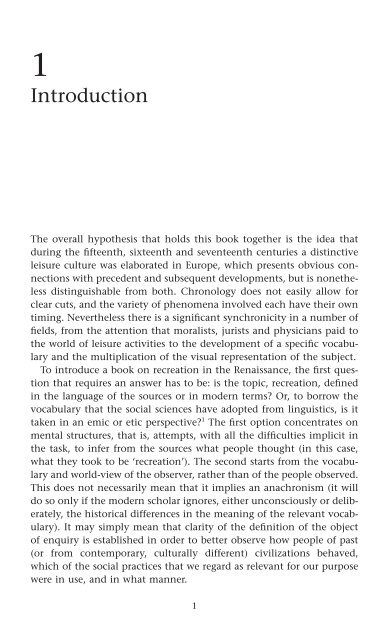Recreation in the Renaissance
Recreation in the Renaissance
Recreation in the Renaissance
- No tags were found...
Create successful ePaper yourself
Turn your PDF publications into a flip-book with our unique Google optimized e-Paper software.
1<br />
Introduction<br />
The overall hypo<strong>the</strong>sis that holds this book toge<strong>the</strong>r is <strong>the</strong> idea that<br />
dur<strong>in</strong>g <strong>the</strong> fifteenth, sixteenth and seventeenth centuries a dist<strong>in</strong>ctive<br />
leisure culture was elaborated <strong>in</strong> Europe, which presents obvious connections<br />
with precedent and subsequent developments, but is none<strong>the</strong>less<br />
dist<strong>in</strong>guishable from both. Chronology does not easily allow for<br />
clear cuts, and <strong>the</strong> variety of phenomena <strong>in</strong>volved each have <strong>the</strong>ir own<br />
tim<strong>in</strong>g. Never<strong>the</strong>less <strong>the</strong>re is a significant synchronicity <strong>in</strong> a number of<br />
fields, from <strong>the</strong> attention that moralists, jurists and physicians paid to<br />
<strong>the</strong> world of leisure activities to <strong>the</strong> development of a specific vocabulary<br />
and <strong>the</strong> multiplication of <strong>the</strong> visual representation of <strong>the</strong> subject.<br />
To <strong>in</strong>troduce a book on recreation <strong>in</strong> <strong>the</strong> <strong>Renaissance</strong>, <strong>the</strong> first question<br />
that requires an answer has to be: is <strong>the</strong> topic, recreation, def<strong>in</strong>ed<br />
<strong>in</strong> <strong>the</strong> language of <strong>the</strong> sources or <strong>in</strong> modern terms Or, to borrow <strong>the</strong><br />
vocabulary that <strong>the</strong> social sciences have adopted from l<strong>in</strong>guistics, is it<br />
taken <strong>in</strong> an emic or etic perspective 1 The first option concentrates on<br />
mental structures, that is, attempts, with all <strong>the</strong> difficulties implicit <strong>in</strong><br />
<strong>the</strong> task, to <strong>in</strong>fer from <strong>the</strong> sources what people thought (<strong>in</strong> this case,<br />
what <strong>the</strong>y took to be ‘recreation’). The second starts from <strong>the</strong> vocabulary<br />
and world-view of <strong>the</strong> observer, ra<strong>the</strong>r than of <strong>the</strong> people observed.<br />
This does not necessarily mean that it implies an anachronism (it will<br />
do so only if <strong>the</strong> modern scholar ignores, ei<strong>the</strong>r unconsciously or deliberately,<br />
<strong>the</strong> historical differences <strong>in</strong> <strong>the</strong> mean<strong>in</strong>g of <strong>the</strong> relevant vocabulary).<br />
It may simply mean that clarity of <strong>the</strong> def<strong>in</strong>ition of <strong>the</strong> object<br />
of enquiry is established <strong>in</strong> order to better observe how people of past<br />
(or from contemporary, culturally different) civilizations behaved,<br />
which of <strong>the</strong> social practices that we regard as relevant for our purpose<br />
were <strong>in</strong> use, and <strong>in</strong> what manner.<br />
1










